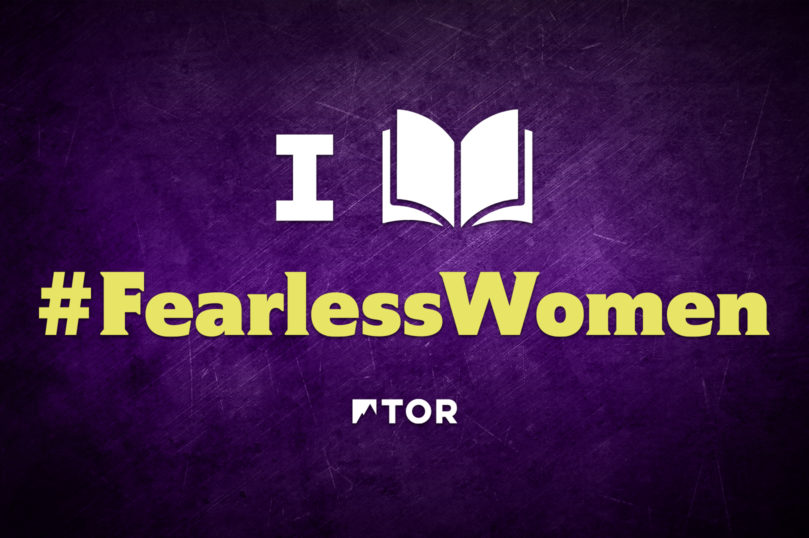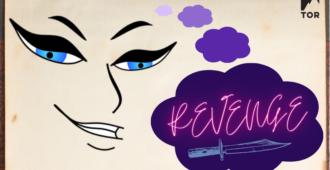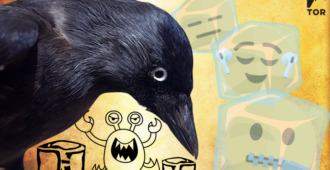We’ve been celebrating Fearless Women all year, and we asked some of the authors who are crafting elaborate worlds and nuanced female characters to chat with us about how they first fell in love with genre storytelling.
How and when did you first fall in love with science fiction and fantasy?
Jacqueline Carey:
Through the wardrobe with Lucy Pevensie! Narnia was my gateway. I’m not sure how old I was, maybe seven. After that, Lloyd Alexander’s Chronicles of Prydain was probably my second great love in the genre. That’s a series that I don’t see discussed often in popular culture, at least in the U.S., but when I reference it, other writers often nod in agreement and understanding.
To this day, I credit Taran Wanderer with teaching me to wrestle with challenging and scary adult concepts like the fact that you don’t always get your heart’s desire. It also gave me a life-long romanticized view of throwing pottery on the wheel (which, I will add, owes nothing to the movie Ghost, although it didn’t hurt.)
V. E. Schwab:
I was eleven when Harry Potter came out, so I am indebted to it for making me a reader, while Neil Gaiman’s work in poetry and prose made me a writer, and Susanna Clarke’s Jonathan Strange and Mr. Norrell swept me away.
Sherrilyn Kenyon:
Honestly? Before I was born. My mother was a huge fan and I’m sure I heard it in the womb and knew I was in love prior to my arrival. One of my earliest childhood memories is turning the kitchen chairs on their sides and pretending I was an astronaut blasting into space. The first novel I wrote at eight years old was sci-fantasy mixed with horror. Maybe it’s because I was born the same year Star Trek debuted, but I was hooked and can’t imagine a life without it.
Mary Robinette Kowal:
I honestly don’t remember a time that I wasn’t reading science fiction. Children’s literature doesn’t draw the hard lines that adult works do. But I’ll tell you the first book that I was conscious of as science fiction: Enchantress from the Stars by Sylvia Engdahl. It’s YA, but I read it in elementary school, and it’s the first one that I remember finishing and thinking “I want more books like this.”
S. L. Huang:
I was long gone as a SFF fan before I even knew it was a genre. Thanks to my mom, the public library was a regular destination growing up, and I remember coming home every week with another boatload of books. I also spent all my allowance on books—well, books and Legos! I read everything I could get my hands on, and it was only much later that I looked at my shelves and realized somewhere along the way all my favorites had ended up being the ones with spaceships and sword fights.
If I had to take a guess, I’d say I love SFF so much because of the way it allows us to examine real, hard truths about the world through a metaphorical lens—sometimes when it’s too difficult to look at those truths straight on. But also, you know, spaceships and sword fights are just cool.
Robyn Bennis:
Like most nerds of my generation, my initiation came via Star Trek reruns. I might have been seven when I started watching the original series obsessively. It started as a childish interest in aliens and spaceships, but as I matured, I began to appreciate the deeper levels of the show.
I think this is why so many writers cite Star Trek as inspiration. It can be enjoyed on multiple levels, from mindless lightshow to philosophical examination, so it’s always ready to teach you a new lesson in storytelling. Beyond that, there’s such a strong sense of optimism written into the very fiber of the series. Kirk, contrary to his reputation, strives to find a diplomatic solution to every conflict, considering violence not just a last resort, but an outright failure of his core mission. Science and discovery are so highly valued that they’ve become the primary pursuit of Starfleet, with defense second. And need I even mention Uhura, who fearlessly stands up and takes crap from no man, whether they’re friend, enemy, or, in one case, even Abraham Lincoln? Perhaps my favorite moment in the entire series is when Sulu, who’s involuntarily space-drunk, reassures her, “I’ll protect you, fair maiden!” Uhura replies, “Sorry, neither,” and shoots him a look that says, “I can protect myself just fine, dude.”
Sam Hawke:
I can’t remember a time when fantasy and science fiction weren’t part of my life. We grow up surrounded by stories designed to ask ‘what if’ or to transport us to another world, and children seem to be hardwired to enjoy the wonder and curiosity and exploration that those stories invoke in us. It’s no surprise that fairy tales and myths in almost every culture are often based around speculative elements even as they are teaching about people and the real world. Most of the media I consumed as a kid was in the realm of SFF–from Hans Christian Andersen and Grimm Brothers fairy tales, Enid Blyton stories full of magical creatures and different worlds at the top of the Faraway Tree to Star Blazers and Astro Boy on the TV. I guess some people feel like they have to outgrow dragons–I just moved on from picture book dragons to The Hobbit and never looked back.
K Arsenault Rivera:
Honestly, I can’t remember a time I wasn’t interested in genre fiction. As a kid I wrote a letter to the mayor because I thought my elementary school library didn’t have enough books on Greek myth. Between my dad fostering in me a love of ridiculous over the top video games from a young age there was really no other path for me to walk. Or read, as it were. If I couldn’t swing a sword at a couple hundred demons while shouting “showtime!”, then I’d have to make a character who could.
Mirah Bolender:
Fantasy was the baseline of every story I read from childhood—what Disney movie or fairy tale isn’t fantasy?—but what really solidified it for me was discovering the Redwall series in elementary school. I latched onto sword-wielding mice and never looked back.
Fran Wilde:
I was eight, and being raised by a library and a small independent bookstore. The bookstore kept a box of science fiction and fantasy novels set aside for my sister and me. The library had a great collection too. We both started reading SFF and we never really stopped.







